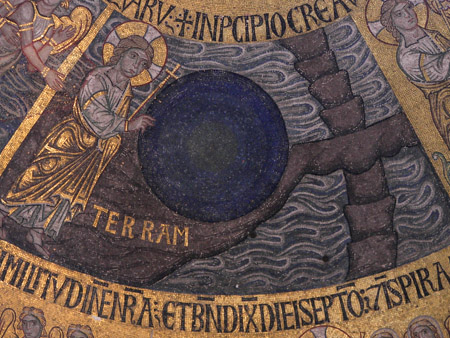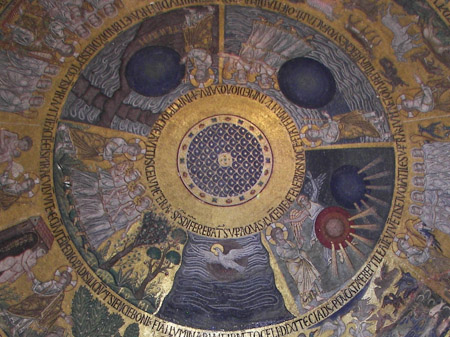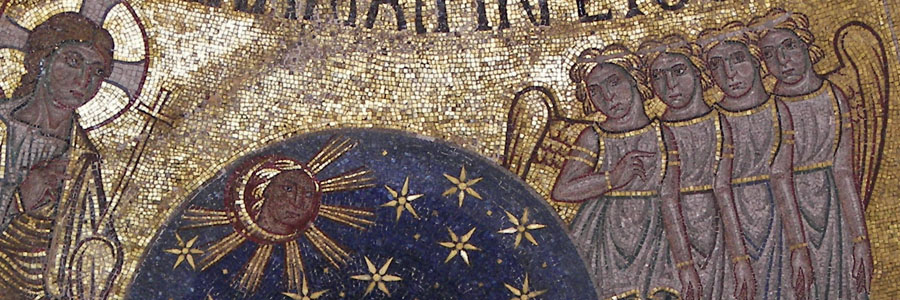In last month’s topic, Gurdjieff on Creation Part 1, we discussed two states: the first, in which we are unknowingly governed by random thoughts, emotions and sensations; the second, in which we awaken and perceive our multiplicity. We superimposed these two states onto the Biblical story of creation, approaching it metaphorically. The comparison proved fitting: before the creation, the earth is in dark chaos, much like the chaos of our psychological sleep; the second is the creation of light, much like the light of self-observation that reveals our sleep. Most writers agreed that there was some mystery behind the appearance of the light of self-observation. If this is so, and if awakening arrives mysteriously, then it may just as mysteriously depart. Therefore, to prolong awakening, the process of creation must continue. In this month, we will explore the necessary next step, without which awakening falls back into sleep. The Biblical creation continues with a series of ‘divisions’:
“And God said, Let there be a firmament in the midst of the waters, and let it divide the waters from the waters… Let the waters under the heaven be gathered together unto one place, and let the dry land appear…” – Book of Genesis
 The second step in the Biblical creation is division. This is an obvious next step, because division could not have happened before the first step of light. We cannot organize a messy room in the dark, and organic life could not be created without first dividing the waters to reveal dry land. If these are metaphors of psychological truths, then how does ‘division’ manifest in the micro-cosmos man?
The second step in the Biblical creation is division. This is an obvious next step, because division could not have happened before the first step of light. We cannot organize a messy room in the dark, and organic life could not be created without first dividing the waters to reveal dry land. If these are metaphors of psychological truths, then how does ‘division’ manifest in the micro-cosmos man?
Gurdjieff on Division
“Work starts from the moment man begins to feel two men in himself. One is the man he calls ‘I’ and whom others call ‘Ouspensky’…’ The other is the real he, the real I, which appears in his life only for very short moments and which can become firm and permanent only after a very lengthy period of work.” – George Gurdjieff
 The light of self-observation invites a division. It reveals a host of internal manifestations, some useful, some harmless and others harmful. For example, actions that turned on the light are obviously useful to awakening. Actions that formerly kept us asleep are harmful. To prolong our awakening, we must separate the harmful from the useful, and plant our efforts on the firm ground of the real. Gurdjieff stresses that this division is a critical moment in the work. A man cannot do this by himself, because he inevitably deceives himself, favoring flattering characteristics regardless of their contribution to awakening. Yet if this division is achieved, man undergoes an internal revolution wherein the former government of many ‘I’s is replaced by a new government of real ‘I’. With the theme of ‘division’ in mind, this month’s question to my writers is: can you give a personal example of a false manifestation that must be stopped for self-remembering to be prolonged?
The light of self-observation invites a division. It reveals a host of internal manifestations, some useful, some harmless and others harmful. For example, actions that turned on the light are obviously useful to awakening. Actions that formerly kept us asleep are harmful. To prolong our awakening, we must separate the harmful from the useful, and plant our efforts on the firm ground of the real. Gurdjieff stresses that this division is a critical moment in the work. A man cannot do this by himself, because he inevitably deceives himself, favoring flattering characteristics regardless of their contribution to awakening. Yet if this division is achieved, man undergoes an internal revolution wherein the former government of many ‘I’s is replaced by a new government of real ‘I’. With the theme of ‘division’ in mind, this month’s question to my writers is: can you give a personal example of a false manifestation that must be stopped for self-remembering to be prolonged?
“To begin self-study, it is necessary to divide oneself. You must learn to divide the real from the invented.” – Peter Ouspensky
